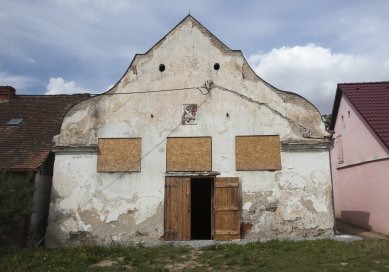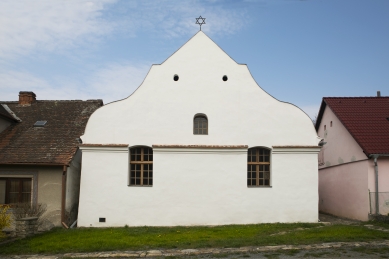
The renovation of the synagogue in Police near Třebíč has received the Patrimonium pro futuro award
In the 8th year of the National Heritage Institute Award Patrimonium pro futuro, a nominee from the Vysočina Region won. In category I. Restoration of the monument, the Federation of Jewish Communities in the Czech Republic received the winning award for the complete restoration of a unique rural synagogue in Polici u Jemnice.
During the restoration from 2012 to 2020, the synagogue was stripped of modern building interventions. In addition to saving the structural substance of the building, which was primarily threatened by increased humidity, the interior features were restored and largely reconstructed, including wall paintings and stucco decoration. The discovery of remnants of the base of the central pulpit in the layer of the historic floor allowed its reconstruction, which is analogously derived from similar, rarely preserved elements elsewhere. Similarly, based on the findings of stone bases of columns along the western wall of the interior, it was possible to reconstruct the women's gallery in a credible form close to the original.
"The synagogue is part of the entire urban complex of the Jewish street, built between 1723 and 1728, which has been preserved in Polici in almost complete condition. Especially for its uniqueness, its heritage value exceeds the boundaries of Central Europe," adds Petr Severa from the Telč office of the National Heritage Institute, who oversaw the restoration.
The synagogue in Polici u Jemnice in the Třebíč region is located in the middle of the former Jewish quarter. It is a single-storey hall building with an almost square floor plan and a triangular gabled roof, built in 1759 in the style of rural Baroque. Valuable relics of synagogue architecture have been preserved in the interior.
The oldest written record of Jewish settlement dates back to 1671. The Jewish community experienced its greatest flourishing in the 18th century. At that time, there were 40-50 families living in Polici. After the issuance of the relocation rescript, the Jews had to move in 1728 from their homes in the village square to the newly established Jewish street south of the castle, where Count Adam Berchtold had about 25 houses built for them. Thus, the original synagogue in the village square came into the hands of a Christian owner, creating the need to build a new synagogue. This was built in Polici in the second half of the 18th century at the expense of Izák Landesmann, on the site of the former (likely wooden) synagogue, which burned down in 1758. After 1848, the number of Jewish residents rapidly declined. In the 1990s, the Jewish community was merged with the municipality in Jemnice, and in 1913, the last Jew moved away from Polici. It served its purpose until the early 20th century when the municipality sold the building to the estate owner Alfred Vražd, Count of Kunevald. He donated it to the local Sokol Association in 1919.
At the beginning of the 21st century, the Zecher Foundation, established by the Federation of Jewish Communities in the Czech Republic (FŽO in the Czech Republic) for the preservation of Jewish monuments, included the synagogue on the list of imminently endangered buildings. The building, then owned by Sokol Moravské Budějovice, had stood abandoned for several years. In 2003, FŽO in the Czech Republic acquired it and gradually secured all necessary documents for restoration – archaeological, restoration, and architectural-historical surveys, further restoration and usage studies, implementation projects, binding opinions from the planning department, building permits, contractor selection processes, and began seeking necessary funding. The actual construction restoration commenced in 2012 with the chosen contractor – the company Stavební huť Slavonice. The investor regularly organized inspection days with representatives of the heritage care authority, during which the process of restoration work was refined and adjusted through consultations and discussions.
The National Heritage Institute Award Patrimonium pro futuro with the subtitle Social Recognition of Examples of Good Practice has been announced and awarded by the NPU since 2014 in an effort to evaluate and highlight what has been achieved in the field of heritage care, and to honor those who contributed to successful works. For each region, experts from the NPU, who guarantee heritage care in individual areas, can select representatives who will compete for the award in one of the basic categories: restoration of the monument; restoration; heritage conversion; discovery, find of the year; presentation and popularization; preservation of monuments; exemplary management and presentation of heritage sites. While nominations for the NPU Patrimonium pro futuro Award are evaluated by experts who select winners in various categories, the general public can choose their favorite in the online voting Thank You, Heritage Sites.
During the restoration from 2012 to 2020, the synagogue was stripped of modern building interventions. In addition to saving the structural substance of the building, which was primarily threatened by increased humidity, the interior features were restored and largely reconstructed, including wall paintings and stucco decoration. The discovery of remnants of the base of the central pulpit in the layer of the historic floor allowed its reconstruction, which is analogously derived from similar, rarely preserved elements elsewhere. Similarly, based on the findings of stone bases of columns along the western wall of the interior, it was possible to reconstruct the women's gallery in a credible form close to the original.
"The synagogue is part of the entire urban complex of the Jewish street, built between 1723 and 1728, which has been preserved in Polici in almost complete condition. Especially for its uniqueness, its heritage value exceeds the boundaries of Central Europe," adds Petr Severa from the Telč office of the National Heritage Institute, who oversaw the restoration.
The synagogue in Polici u Jemnice in the Třebíč region is located in the middle of the former Jewish quarter. It is a single-storey hall building with an almost square floor plan and a triangular gabled roof, built in 1759 in the style of rural Baroque. Valuable relics of synagogue architecture have been preserved in the interior.
The oldest written record of Jewish settlement dates back to 1671. The Jewish community experienced its greatest flourishing in the 18th century. At that time, there were 40-50 families living in Polici. After the issuance of the relocation rescript, the Jews had to move in 1728 from their homes in the village square to the newly established Jewish street south of the castle, where Count Adam Berchtold had about 25 houses built for them. Thus, the original synagogue in the village square came into the hands of a Christian owner, creating the need to build a new synagogue. This was built in Polici in the second half of the 18th century at the expense of Izák Landesmann, on the site of the former (likely wooden) synagogue, which burned down in 1758. After 1848, the number of Jewish residents rapidly declined. In the 1990s, the Jewish community was merged with the municipality in Jemnice, and in 1913, the last Jew moved away from Polici. It served its purpose until the early 20th century when the municipality sold the building to the estate owner Alfred Vražd, Count of Kunevald. He donated it to the local Sokol Association in 1919.
At the beginning of the 21st century, the Zecher Foundation, established by the Federation of Jewish Communities in the Czech Republic (FŽO in the Czech Republic) for the preservation of Jewish monuments, included the synagogue on the list of imminently endangered buildings. The building, then owned by Sokol Moravské Budějovice, had stood abandoned for several years. In 2003, FŽO in the Czech Republic acquired it and gradually secured all necessary documents for restoration – archaeological, restoration, and architectural-historical surveys, further restoration and usage studies, implementation projects, binding opinions from the planning department, building permits, contractor selection processes, and began seeking necessary funding. The actual construction restoration commenced in 2012 with the chosen contractor – the company Stavební huť Slavonice. The investor regularly organized inspection days with representatives of the heritage care authority, during which the process of restoration work was refined and adjusted through consultations and discussions.
The National Heritage Institute Award Patrimonium pro futuro with the subtitle Social Recognition of Examples of Good Practice has been announced and awarded by the NPU since 2014 in an effort to evaluate and highlight what has been achieved in the field of heritage care, and to honor those who contributed to successful works. For each region, experts from the NPU, who guarantee heritage care in individual areas, can select representatives who will compete for the award in one of the basic categories: restoration of the monument; restoration; heritage conversion; discovery, find of the year; presentation and popularization; preservation of monuments; exemplary management and presentation of heritage sites. While nominations for the NPU Patrimonium pro futuro Award are evaluated by experts who select winners in various categories, the general public can choose their favorite in the online voting Thank You, Heritage Sites.
The English translation is powered by AI tool. Switch to Czech to view the original text source.



0 comments
add comment








